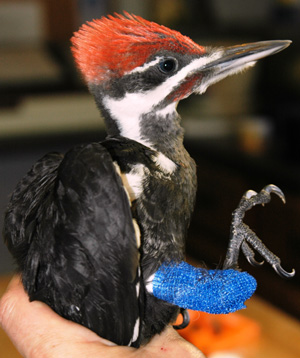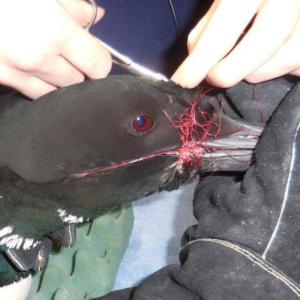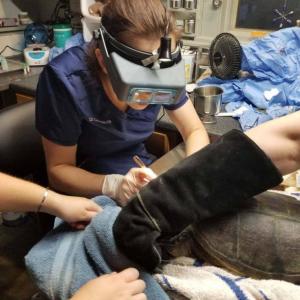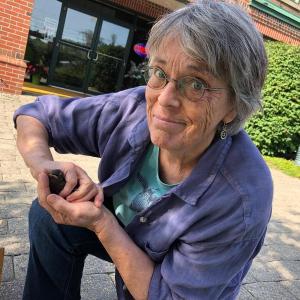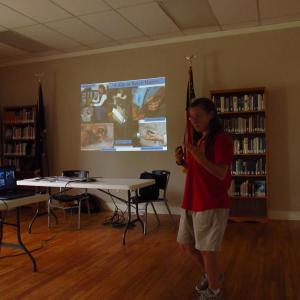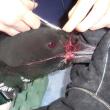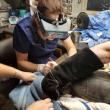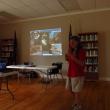How to handle an injured bird or reptile
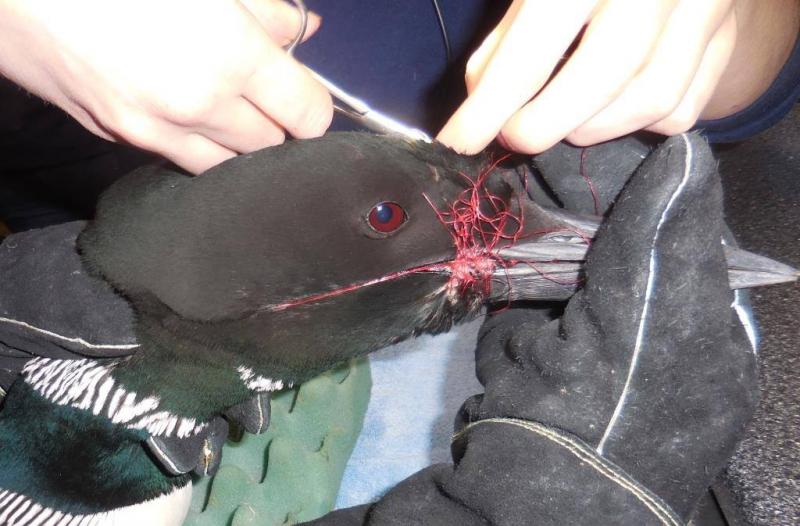 Avian Haven rescues an injured loon on Messalonskee Lake
“We began by removing the line from the loon's beak and head. Before proceeding with the line inside her mouth, we took an x-ray, which showed fishing gear in her esophagus.” Photo courtesy Avian Haven
Avian Haven rescues an injured loon on Messalonskee Lake
“We began by removing the line from the loon's beak and head. Before proceeding with the line inside her mouth, we took an x-ray, which showed fishing gear in her esophagus.” Photo courtesy Avian Haven
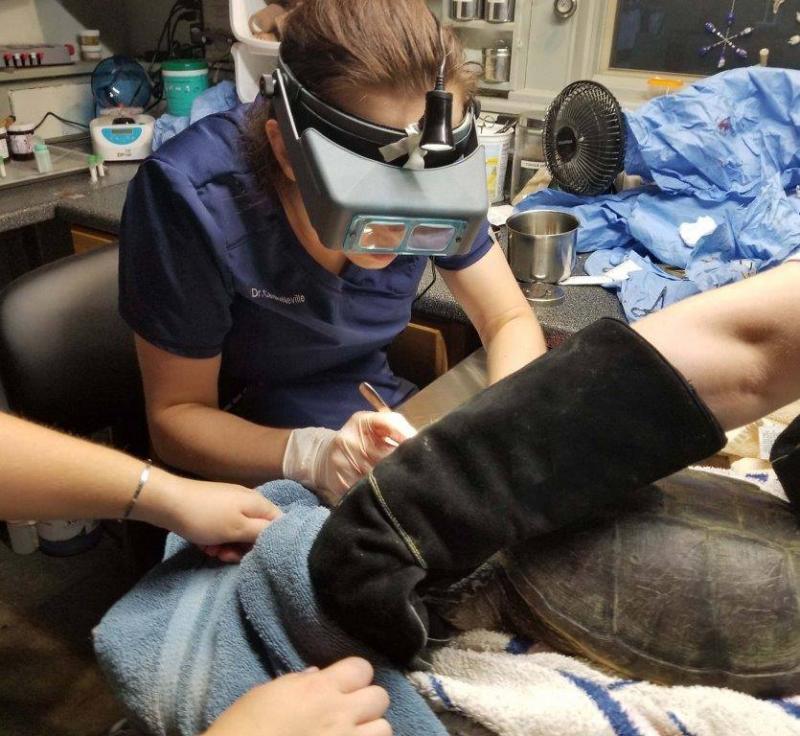 Snapping Turtle H-30 Long Pond (Belgrade) Dr. Neville surgically removes the large hook. Photo courtesy Avian Haven
Snapping Turtle H-30 Long Pond (Belgrade) Dr. Neville surgically removes the large hook. Photo courtesy Avian Haven
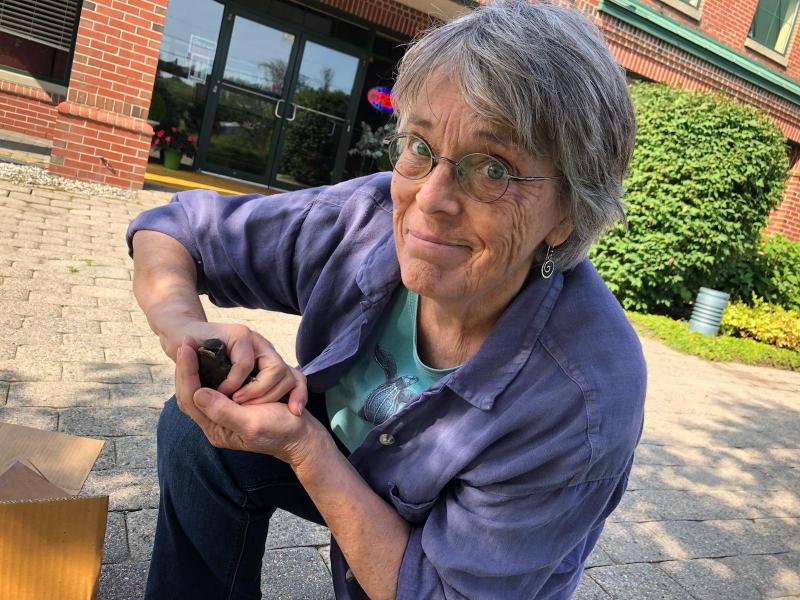 Long time volunteer Selkie O’Meara, of Camden, transports a cedar waxwing from Camden, where it had been rescued on the Rockport waterfront, to Freedom, Aug. 20. (Photo courtesy Lynda Clancy)
Long time volunteer Selkie O’Meara, of Camden, transports a cedar waxwing from Camden, where it had been rescued on the Rockport waterfront, to Freedom, Aug. 20. (Photo courtesy Lynda Clancy)
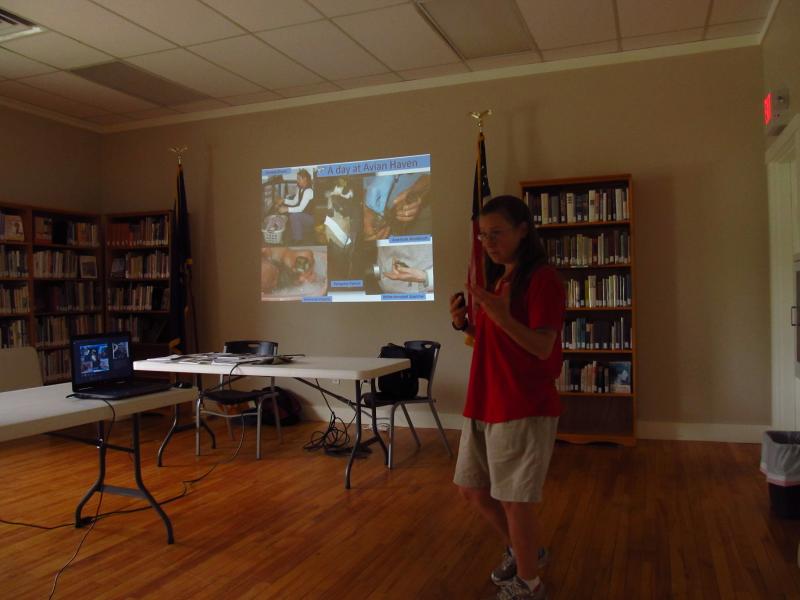 Laura Suomi-Lecker, their Education Outreach Coordinator gave a moving presentation at the Hope Library on August 7. (Photo by Kay Stephens)
Laura Suomi-Lecker, their Education Outreach Coordinator gave a moving presentation at the Hope Library on August 7. (Photo by Kay Stephens)
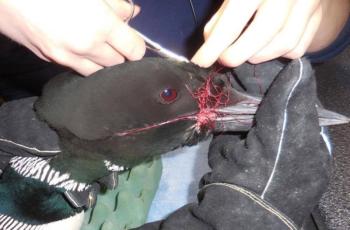 Avian Haven rescues an injured loon on Messalonskee Lake
“We began by removing the line from the loon's beak and head. Before proceeding with the line inside her mouth, we took an x-ray, which showed fishing gear in her esophagus.” Photo courtesy Avian Haven
Avian Haven rescues an injured loon on Messalonskee Lake
“We began by removing the line from the loon's beak and head. Before proceeding with the line inside her mouth, we took an x-ray, which showed fishing gear in her esophagus.” Photo courtesy Avian Haven
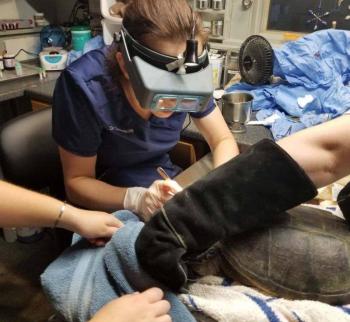 Snapping Turtle H-30 Long Pond (Belgrade) Dr. Neville surgically removes the large hook. Photo courtesy Avian Haven
Snapping Turtle H-30 Long Pond (Belgrade) Dr. Neville surgically removes the large hook. Photo courtesy Avian Haven
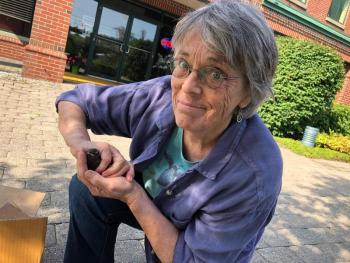 Long time volunteer Selkie O’Meara, of Camden, transports a cedar waxwing from Camden, where it had been rescued on the Rockport waterfront, to Freedom, Aug. 20. (Photo courtesy Lynda Clancy)
Long time volunteer Selkie O’Meara, of Camden, transports a cedar waxwing from Camden, where it had been rescued on the Rockport waterfront, to Freedom, Aug. 20. (Photo courtesy Lynda Clancy)
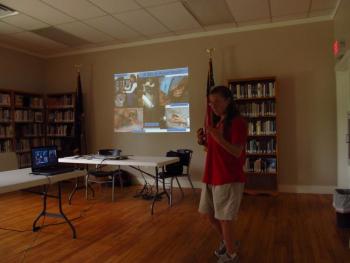 Laura Suomi-Lecker, their Education Outreach Coordinator gave a moving presentation at the Hope Library on August 7. (Photo by Kay Stephens)
Laura Suomi-Lecker, their Education Outreach Coordinator gave a moving presentation at the Hope Library on August 7. (Photo by Kay Stephens)
Summer is a dangerous time for birds, mainly due to human behavior and interference, but there is a lot we can do to be proactive and save their lives.
Avian Haven, a nationally known wild bird rehabilitation center based in Freedom is one of the largest rehabilitation practices in New England.
Founded by Marc Payne and Diane Winn in 1999, nearly 15,000 birds from more than 100 species have been treated at their facilities.
On their property, 15 buildings, some of them comprising multiple flight cages, provide pre-release conditioning for a variety of species ranging in size from Hummingbirds to Bald Eagles and including aquatic birds such as Common Loons and pelagic species.
More than 2,500 birds were admitted to Avian Haven last year. The main cause of injuries are cat predation, car collisions, and window strikes.
Laura Suomi-Lecker, their Education Outreach Coordinator, gave a moving presentation at the Hope Library August 7 to a packed audience. The presentation was primarily about how birds are typically injured and what people can do to prevent it and save them. Given the nonprofit’s name, it was a surprise to many that the center also admits 30-40 reptiles a year, mostly turtles that have been hit by cars.
“Marc Payne has been able to save a number of car-hit turtles by using a custom adhesive to repair their cracked shells, but even they can’t be saved, if their egg sac is still intact, he will harvest the eggs and incubate them,” said Suomi-Lecker.
What people can do to prevent these injuries:
- Keep cats inside or within an outdoor cat enclosure, especially during nesting season, which for most species occurs from late May through early August.
- If your cats must be outdoors consider buying a cat bib, which prevents them from pouncing.
- Save birds from hitting house windows by applying decals, screens or film.
- Leave areas of standing grass and fields in your yard rather than mow it all down or consider different mowing practices by mowing pathways and leaving natural areas.
- Avoid cutting live trees during spring and summer and leave dead trees alone: many raptors, woodpeckers, chickadees and warblers nest in dead trees and cavities.
- Avoid using lead ammunition when hunting: birds get poisoned when eating prey that has been shot with lead. Here is where to purchase non-lead ammunition instead
- Likewise, don’t use lead fishing tackle: it’s the number one cause of adult loon deaths. Here’s where you can purchase non-lead fishing tackle instead.
- Retrieve all fishing gear from your site when done; loons and other birds are commonly taken to Avian Haven with their bills and throats ensnared with monofilament.
- Many pesticides (rodent poison,ant poison, herbicide, garden chemicals) are toxic to birds.
- Fly paper sticky rodent traps, artificial spider webs (for Halloween decorations) and frayed pieces from plastic tarps can all trap and entangle flying birds.
Some of the photos that Suomi-Lecker shared to the audience were heartbreaking: a lead-poisoned eagle, a loon entangled with monofilament, a snapping turtle receiving sutures and even a tiny cast on a frog’s leg.
I found a bird.
(Photo by Amy Campbell) |
Suomi-Lecker also shared some practical tips for people who encounter injured or sick birds.
- First get the bird out of harm’s way. Be safe and use gloves or a towel to retrieve a large bird.
- Put an old sweatshirt or towel in the bottom of a closeable cardboard box. For birds that are unable to stand, you can roll a second towel into a U-shape to keep the bird sitting upright.
- Make sure the box is covered and put air holes around the top of the box.
- Call Avian Haven, which is open seven days a week and can be reached at 382-6761.
- Young birds without feathers will need an added heat source such as a heating pad or hot water bottle.
- Don’t attempt to feed the bird anything, unless instructed to do so by a licensed rehabilitator.
Avian Haven’s main goal is to rehabilitate the birds and reptiles. For birds, flight-conditioning in the outdoor flight cages is the final step, so they can go back to into the wild, a feat that can take months. During that time the volunteers and staff do get attached to the birds and reptiles and every successful release is the reward for all of the hard and sometimes heart-breaking work.
For more information, see the many ways to support Avian Haven. They welcome volunteers from the community to work on site and/or transport birds to us from surrounding communities.
To see more stories of the individual birds and reptiles they’ve saved, go to Avian Haven’s Facebook Gallery
Related: Injured barred owl in Camden rescued, taken to Avian Haven
Kay Stephens can be reached at news@penbaypilot.com
Event Date
Address
United States

